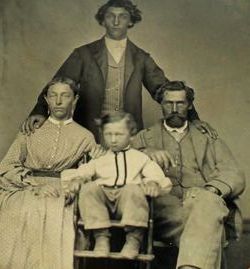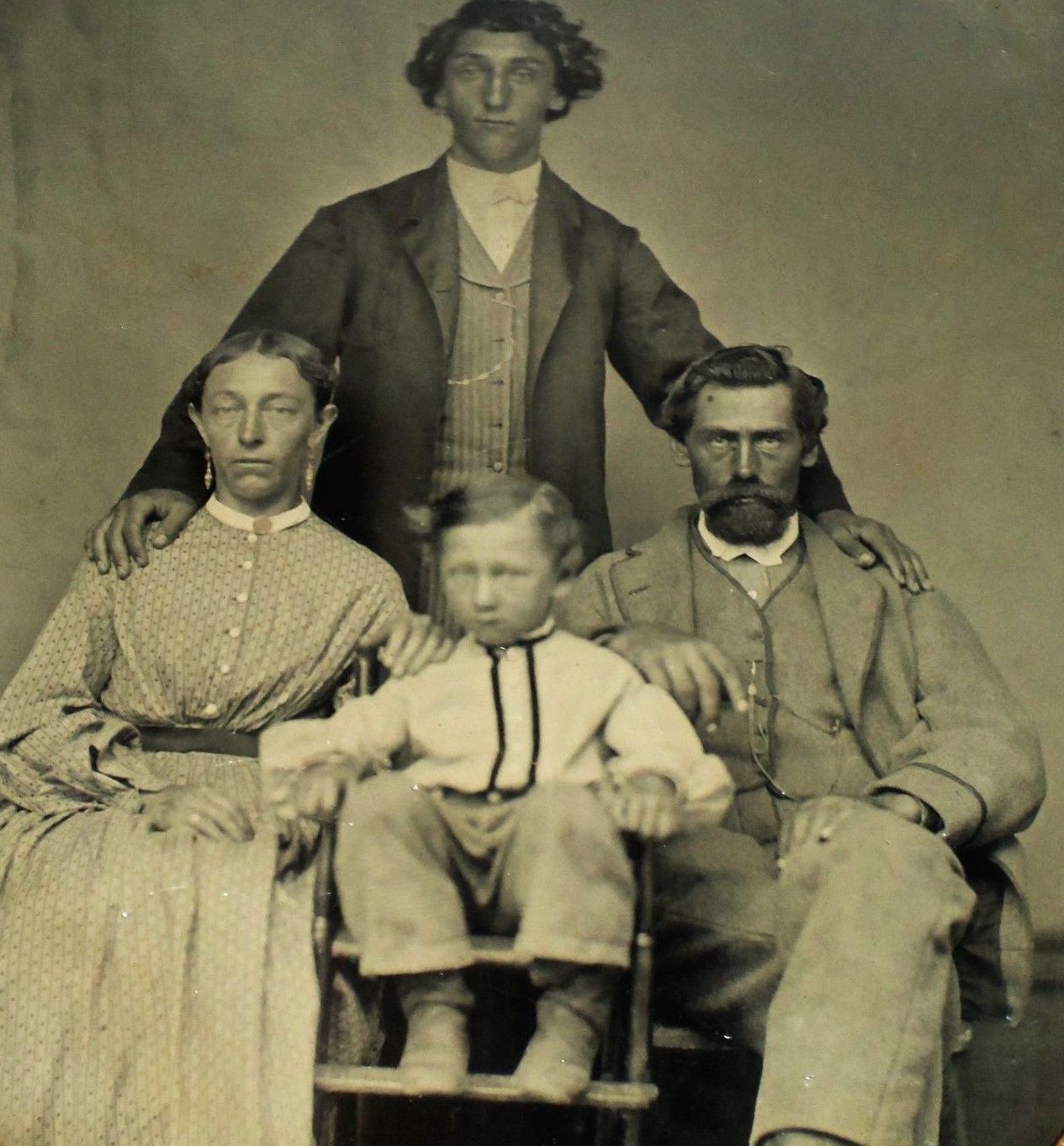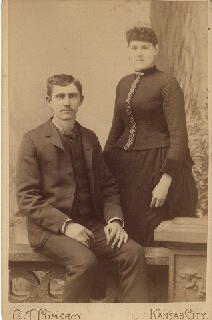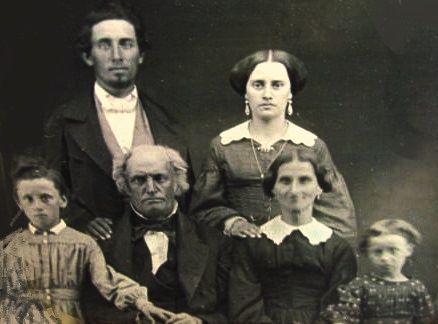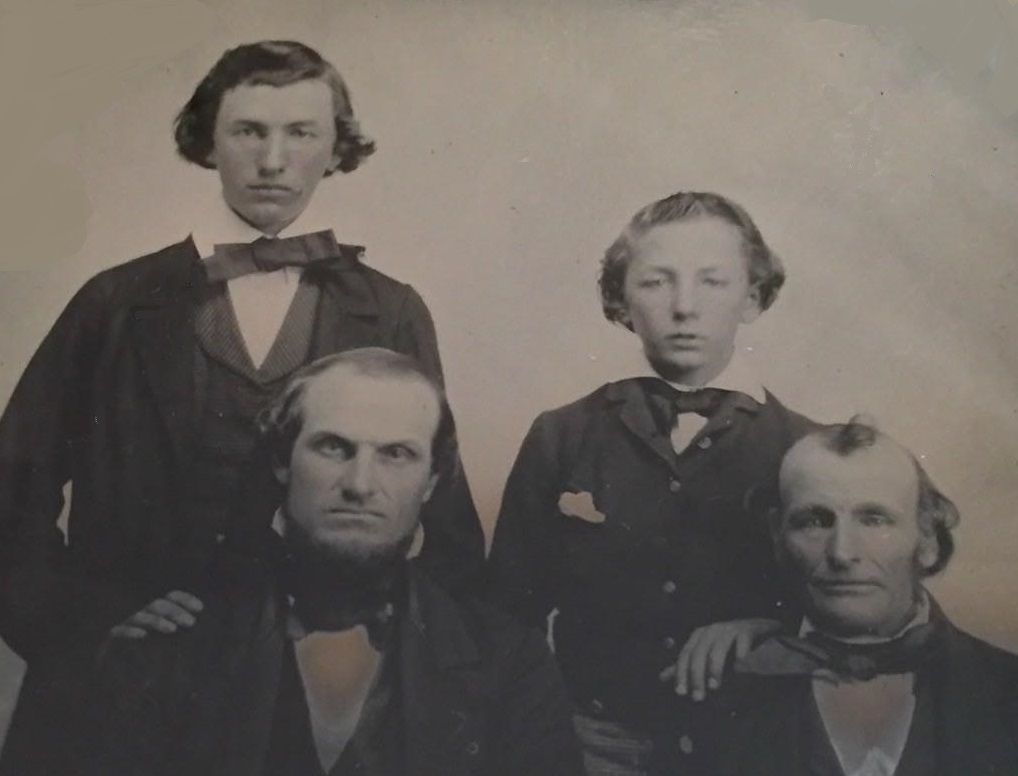THE SWEET FAMILY [Excerpt]
History of These old Pioneers and Reminiscences
Told a Reporter in June 1924 by Gilbert Sweet of the Days when Bill Anderson Terrorized Kansas
Gilbert C. Sweet, who lived three miles north of Admire on 142 Creek, is one of the few remaining residents who can tell from personal observation and recollection, the story of the Anderson Outlaws, and the beginning of their outlawry. The elder Anderson, his wife and two sons, Bill and Jim, had come from Missouri and settled near Bluff Creek crossing in the old Santa Fe trail, in a community made up largely of Free State men and women--and the Andersons were pro-slavery. Their reputation in the neighborhood from the start was not of the best-Bill Anderson rode good horses, and it was suspected that he stole them. Once he was arrested and his trial held in the store building on the old Allen townsite, but he was not convicted. Mr. Harris, proprietor of the store "in which," relates Mr. Sweet, "Harris kept stock meal and salt and molasses and bacon, and maybe a few barrel or two of whiskey," believed Bill Anderson was guilty, and said so, and said, also, that ordinarily he did not believe in mob violence, but in this case he believed Anderson should be lynched. Anderson jumped for Harris and hit him over the head with a board, but got away and no further action was taken.
Mrs. Anderson was killed by lightning in 1860. Her body was interred on the old Withington place on the Santa Fe trail, now part of the George DeCamp farm. The next year the elder Anderson and A.I. Baker, a settler in that locality, met one day at the Rock Creek crossing five miles west of the Santa Fe trail, Anderson picked a quarrel with Baker. There probably was slight excuse for a disagreement says Mr. Sweet, but it gave an excuse for an exhibition of the vindictive Anderson nature. He threatened to kill Baker, and followed him home. Baker had gone to the loft of his cabin, hoping that when Anderson didn't see him in the house he would leave the place. But Anderson stayed, making many threats and said he would search the loft for him, and if he found him, would shoot him. Baker hearing Anderson's threats pointed his gun through a crack in the floor and as he fired, he called out in a loud voice, "I shoot you in my own defense." Other men were in the house, one of them an officer from Emporia, who had followed Anderson to arrest him on a horse-stealing charge, and Henry Jacoby, who lived then near the old Agnes City post office, now of Reading, had come to help in the arrest of Anderson. As Anderson started to the stairway, Jacoby tried to pull him back, and as Baker fired Anderson reeled, the shot causing instant death, and he died in Jacoby's arms. No action was taken against Baker, there being ample evidence that he had fired in self defense. Anderson was buried beside the body of Mrs. Anderson, and the graves long have been lost the soil above them is in cultivation, and no one can point out the spot where the bodies lie. After the killing of Anderson, the body was removed from the Baker house and lay all day in the back yard. Baker unable to endure this any longer, that evening told his family that this was not the right thing to do, and said he would hitch up his team of mules and take the body to the Anderson home which he did.
Bill and Jim Anderson soon after this drifted off to the Sni Hills, in Missouri, where they had relatives. They had sworn to be revenged for the death of their father, and made their troubles an excuse for the career of bushwhacking in which they engaged with the Quantrill gang. The Anderson[s] returned to Lyon county in 1862, bringing with them several other men. Their gang rode at night to the Baker house and surrounded it, and Bill Anderson ordered Baker to come out. Mrs. Baker told him Mr. Baker was not in the house, and he replied that he knew she was lying, that if Baker was not in the house he was in the cellar and that there was no escape for him. The small windows were guarded, and there was no chance for him. The ruffians continued to call on Baker to come out, but he refused to answer or appear.
Finally the gang set fire to the house and declared they'd smoke him out. Baker realizing that escape was impossible, shot and killed himself with the pistol he carried, rather than be burned to death, or be tortured by the Andersons. Mrs. Baker escaped. Baker lived at Agnes City, and was a man of parts-an attorney and councilor-at-law, and a notary public. He was a good man and a valuable citizen.
When the Anderson gang left the neighborhood, after the raid on the Baker home, they stole a team of stage horses and rode them to Baldwin, where they left them, and where the owners afterward recovered them. Following the killing of Baker, the gang went to the Jacoby home, and demanded that Jacoby appear. They had a grudge against Jacoby, too, though he had been innocent of any offense against them. A minister named Wiggans who was visiting at the Jacoby home went to the door and told the men that Jacoby was not here. "I think he is there," said Bill Anderson, "and he'd better come on out." Jacoby not appearing the gang amused themselves by firing several times into the closed door then went on. They were rather in a hurry as daylight was coming, and one of the Andersons had shot himself accidently, in the leg, and it needed attention, and for that reason, as well as not wishing to be seen, they were eager to get away, which probably saved Henry Jacoby from a fate similar to that of Baker. The Andersons at this time returned to Missouri and made no further disturbance in this section of the country for a considerable time although history recites that they were identified with the Quantrill gang and its raid further east in Kansas. The door of the Jacoby home, filled with the bullet holes, years later was taken to Topeka, and is a relic in the historical collection on the Memorial building.
Some men thought to have been the Andersons in company with others, passed through this section of the country a few years later, and were suspected of stealing horses. Part of a company of state militia, of which Mr. Sweet was a member, followed them a long way up the Cottonwood [River] but lost the trail and they heard no more of the gang. Bill Anderson, as history relates, while a member of the Quantrill gang, rode a big white horse which had been given to him by his wife, and which made him a target for his enemies. At the last, when surrounded by Union men, when he knew he might expect no quarter, he took his bridle reins in his teeth, and with a revolver in each hand, tried to ride, through the group of Union soldiers, shooting right and left, but fell, mortally wounded.
***********************
From FAG Contributor #47929277:
The 2nd photo labled 1855 - WAS TAKEN IN THE 1880s CANNOT BE WM SR &WIFE
Contributor: Kirk D. Lyons (∼s/o Joseph Anderson
& Mary McElroy
married, Martha Jane Thomason
children:
William T
Mary Ellen
Josephine
James "Jim"
Ellis
Jane "Janie"
occupation in the 1850 Randolph Co MO census was: Hatter
he was killed by Union-Loyalist Judge Baker
THE SWEET FAMILY [Excerpt]
History of These old Pioneers and Reminiscences
Told a Reporter in June 1924 by Gilbert Sweet of the Days when Bill Anderson Terrorized Kansas
Gilbert C. Sweet, who lived three miles north of Admire on 142 Creek, is one of the few remaining residents who can tell from personal observation and recollection, the story of the Anderson Outlaws, and the beginning of their outlawry. The elder Anderson, his wife and two sons, Bill and Jim, had come from Missouri and settled near Bluff Creek crossing in the old Santa Fe trail, in a community made up largely of Free State men and women--and the Andersons were pro-slavery. Their reputation in the neighborhood from the start was not of the best-Bill Anderson rode good horses, and it was suspected that he stole them. Once he was arrested and his trial held in the store building on the old Allen townsite, but he was not convicted. Mr. Harris, proprietor of the store "in which," relates Mr. Sweet, "Harris kept stock meal and salt and molasses and bacon, and maybe a few barrel or two of whiskey," believed Bill Anderson was guilty, and said so, and said, also, that ordinarily he did not believe in mob violence, but in this case he believed Anderson should be lynched. Anderson jumped for Harris and hit him over the head with a board, but got away and no further action was taken.
Mrs. Anderson was killed by lightning in 1860. Her body was interred on the old Withington place on the Santa Fe trail, now part of the George DeCamp farm. The next year the elder Anderson and A.I. Baker, a settler in that locality, met one day at the Rock Creek crossing five miles west of the Santa Fe trail, Anderson picked a quarrel with Baker. There probably was slight excuse for a disagreement says Mr. Sweet, but it gave an excuse for an exhibition of the vindictive Anderson nature. He threatened to kill Baker, and followed him home. Baker had gone to the loft of his cabin, hoping that when Anderson didn't see him in the house he would leave the place. But Anderson stayed, making many threats and said he would search the loft for him, and if he found him, would shoot him. Baker hearing Anderson's threats pointed his gun through a crack in the floor and as he fired, he called out in a loud voice, "I shoot you in my own defense." Other men were in the house, one of them an officer from Emporia, who had followed Anderson to arrest him on a horse-stealing charge, and Henry Jacoby, who lived then near the old Agnes City post office, now of Reading, had come to help in the arrest of Anderson. As Anderson started to the stairway, Jacoby tried to pull him back, and as Baker fired Anderson reeled, the shot causing instant death, and he died in Jacoby's arms. No action was taken against Baker, there being ample evidence that he had fired in self defense. Anderson was buried beside the body of Mrs. Anderson, and the graves long have been lost the soil above them is in cultivation, and no one can point out the spot where the bodies lie. After the killing of Anderson, the body was removed from the Baker house and lay all day in the back yard. Baker unable to endure this any longer, that evening told his family that this was not the right thing to do, and said he would hitch up his team of mules and take the body to the Anderson home which he did.
Bill and Jim Anderson soon after this drifted off to the Sni Hills, in Missouri, where they had relatives. They had sworn to be revenged for the death of their father, and made their troubles an excuse for the career of bushwhacking in which they engaged with the Quantrill gang. The Anderson[s] returned to Lyon county in 1862, bringing with them several other men. Their gang rode at night to the Baker house and surrounded it, and Bill Anderson ordered Baker to come out. Mrs. Baker told him Mr. Baker was not in the house, and he replied that he knew she was lying, that if Baker was not in the house he was in the cellar and that there was no escape for him. The small windows were guarded, and there was no chance for him. The ruffians continued to call on Baker to come out, but he refused to answer or appear.
Finally the gang set fire to the house and declared they'd smoke him out. Baker realizing that escape was impossible, shot and killed himself with the pistol he carried, rather than be burned to death, or be tortured by the Andersons. Mrs. Baker escaped. Baker lived at Agnes City, and was a man of parts-an attorney and councilor-at-law, and a notary public. He was a good man and a valuable citizen.
When the Anderson gang left the neighborhood, after the raid on the Baker home, they stole a team of stage horses and rode them to Baldwin, where they left them, and where the owners afterward recovered them. Following the killing of Baker, the gang went to the Jacoby home, and demanded that Jacoby appear. They had a grudge against Jacoby, too, though he had been innocent of any offense against them. A minister named Wiggans who was visiting at the Jacoby home went to the door and told the men that Jacoby was not here. "I think he is there," said Bill Anderson, "and he'd better come on out." Jacoby not appearing the gang amused themselves by firing several times into the closed door then went on. They were rather in a hurry as daylight was coming, and one of the Andersons had shot himself accidently, in the leg, and it needed attention, and for that reason, as well as not wishing to be seen, they were eager to get away, which probably saved Henry Jacoby from a fate similar to that of Baker. The Andersons at this time returned to Missouri and made no further disturbance in this section of the country for a considerable time although history recites that they were identified with the Quantrill gang and its raid further east in Kansas. The door of the Jacoby home, filled with the bullet holes, years later was taken to Topeka, and is a relic in the historical collection on the Memorial building.
Some men thought to have been the Andersons in company with others, passed through this section of the country a few years later, and were suspected of stealing horses. Part of a company of state militia, of which Mr. Sweet was a member, followed them a long way up the Cottonwood [River] but lost the trail and they heard no more of the gang. Bill Anderson, as history relates, while a member of the Quantrill gang, rode a big white horse which had been given to him by his wife, and which made him a target for his enemies. At the last, when surrounded by Union men, when he knew he might expect no quarter, he took his bridle reins in his teeth, and with a revolver in each hand, tried to ride, through the group of Union soldiers, shooting right and left, but fell, mortally wounded.
***********************
From FAG Contributor #47929277:
The 2nd photo labled 1855 - WAS TAKEN IN THE 1880s CANNOT BE WM SR &WIFE
Contributor: Kirk D. Lyons (∼s/o Joseph Anderson
& Mary McElroy
married, Martha Jane Thomason
children:
William T
Mary Ellen
Josephine
James "Jim"
Ellis
Jane "Janie"
occupation in the 1850 Randolph Co MO census was: Hatter
he was killed by Union-Loyalist Judge Baker
Gravesite Details
Probably buried on private property and unmarked.
Family Members
Advertisement
Explore more
Sponsored by Ancestry
Advertisement
